Donald MacLean's Blog 10
FIREWORKS
One milestone in my 83-year
journey was "Suez".
I wrote a memoir of this interesting/dangerous
episode.
The Financial Times
commissioned a one-page digest and published it in
their "First Person" series on 4th November 2006 - the 50th
anniversary.
This is the original memoir.
_________________________________________________
1956 was, for me, a year of contrasts. I was 30 and no longer the BBC’s youngest producer. I had stopped directing TV programmes like "Dixon of Dock Green" and "Come Dancing" and had become responsible for radio’s popular music output, timed nicely for the forthcoming era of the Beatles and Rolling Stones and giving me an excuse to produce a weekly "Jazz Club" broadcast. My wife and our small son were happy in our new house in a new town near London.
Then the telegram arrived.
|
|
The Suez Canal, a vital artery of world
trade, was a Franco/British enterprise. Egypt was now threatening to nationalise
it, arousing the patriotic ire of Prime Minister Eden. Nine
years after being released from wartime REME I was being recalled as a
reservist Captain to lead a small "Press Communications" unit of Royal Signals.
I had just three days to delegate work and buy some tropical gear then say goodbye to my anxious
wife and baby.
The long hot summer was spent in a camp near the racing stables at Ogbourne St George, doing the fatuous things that armies invent when there is nothing purposeful to do, and listening to reports of the ebb and flow of political posturing. Our mobile radio station and all our vehicles and equipment had departed on a mysterious Movement Order before we had time to discover whether any of it worked.
Early one Autumn evening I was
ordered to report immediately to the RAF transport airbase at Lyneham.
Sergeant Pete (press-ganged, like me, from his job as a bus-driver in
Plymouth) drove me there.
They weren't expecting us ... a circumstance that was to characterise every stage of this story! Pete and I repaired to the respective RAF messes. By midnight I had acquired two new chums, pilots Alex and Brian and - well - none of us was feeling any pain.
The other two were summoned and shortly I was asked to go to the door - to find Pete, envelope in hand, saying "We have to board that plane".
The old Hastings, full of sleepy, khaki-clad figures and kitbags, took-off and droned up into the night. My envelope was marked "Secret - not to be opened until arrival". Following my Boy Scout motto "Be Prepared" I opened it immediately. A cryptic message about reporting urgently to "CSO at UKHQ". I answered Pete's enquiry with "Can't tell you ... our destination's so secret they've omitted it."
I stumbled forward and gingerly opened the door into the flight-deck ... to find a smiling Brian at the controls ... and Flt Lieut Alex deeply asleep in the Captain's seat.
The cold and noise and general discomfort of that night reminded me of my Atlantic sortie (Blog #2) in a flying boat.
Shortly after dawn we landed ... and taxied past a sign reading "Luqa". We were in Malta.
No-one was expecting us.
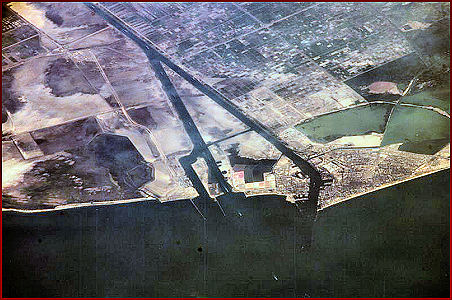 |
|
Port Said from the Int'l Space Station |
Vehicle ferries on the Irish Sea at the time were ex wartime Tank Landing Ships. One of them, like me, had been press-ganged back into service and had spent the summer
(with our untested vehicles baking in its hold) in the Grand Harbour of Malta. I joined it that afternoon. The next morning we were at sea and sailing eastward at a snail’s pace in an armada stretching to the horizon.
The temperature rarely dipped to 90 degrees even at night. Flying fish
were spectacular. BBC World
Service was reporting widespread public opposition to military action … and
ministerial condemnation of the BBC for reporting that.
Sweating with me in the tiny ward-room were two professional infantry officers. We argued constantly. Their theme was "Why all this discussion - we need to teach the wogs a lesson, let’s get on with it". I suggested this was precisely why the UN had been created and that our intervening might be counter-productive and cause the canal to be blocked (it was) - but their mindset was still in the imperial era.
Once before, seventy-four years earlier, our government had misguidedly sent troops to forestall loss of British control of the Suez Canal, although as now its users were unconcerned (and unconsulted).
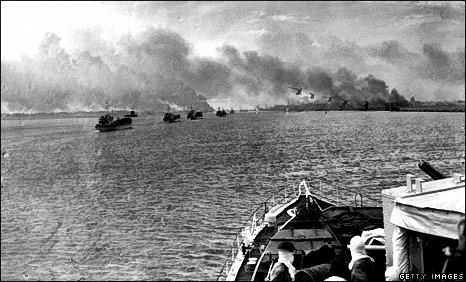
|
|
Invading Port Said, 5th November 1956 |
We reached Port Said on Guy Fawkes’
night. RAF jets blasted the town with rockets. A different kind of
fireworks! Crouching in the darkness as the landing
ramp swung down and the Commandos swarmed out onto the beach ahead of us I was
struck by the contrast with my ‘showbiz’ life, coping with temperamental
celebrities.
A hail of bullets clattered around us every few minutes, answered by tracers arcing up to the many rooftops whence the sniper fire was coming. I guessed that UKHQ might be the Canal Company office and on the way there the jeep was fired-on - getting my head down rapidly I smashed my front teeth on something, but otherwise Pete and I escaped injury. I doubt that any vehicle ever entered the ornate gates of our destination faster!
No-one was expecting us.
In fact the building was empty. Watching the battle through a broken
window it became apparent that we were ahead of the game ... it was almost an
hour before three armoured cars bumbled into the courtyard and a squad of
infantrymen 'secured' UKHQ.
To my relief the invasion was halted within days, under American pressure through the UN.
(The story quickly circulated of how this would have left us in a very vulnerable situation had not a certain Colonel Gibson, commanding the 5th Royal Tank Regiment, mysteriously failed to receive the 'stop' signal until his tanks had got far enough down the road towards Suez to secure our landward flank.)
Unsurprisingly our long-range transmitter was unserviceable and my (very able) engineers were working on it round the clock.
By the end of World War II
several War Correspondents had achieved legendary stature by their bravery as
well as their reporting ... and they all seemed to be there. I was besieged by
these daunting characters, each demanding a table and a typewriter, which we
could give them - and communication with London and Washington, which we could
not.
I contrived a temporary solution involving a ‘borrowed’ aeroplane and a Cable Office in Cyprus … and the less said about that very unofficial operation the better.
I should mention that bus-driver Pete was the kind of entrepreneur that every well-functioning active-service unit needs. When I asked him to try to find a courier going to Cyprus who might be persuaded to take this bundle of typed reports (and he had learned that there was none) he had come back in less than an hour and taken me to the port's little airfield where two members of HM Ordnance Corps were filling the tank of a private Auster. And when I later asked him to request a replacement for our battered jeep (with its neat row of bullet-holes) he collected me the next morning in a comfortable air-conditioned Buick sedan.
With radio communication established, I visited one of the majestic battleships anchored offshore, where a naval dentist conjured up my first set of dentures and I had my first shower in weeks. I was urged to stay for dinner but one look at the room with its white-coated stewards and gleaming silver sent me, in my filthy battledress, back ashore to my hard-working colleagues and baked-beans in a billycan.
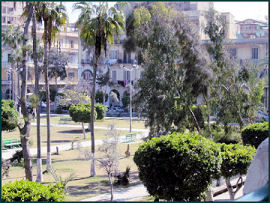 |
While we Brits had apparently elected to invade this downtown part of Port Said our gallant French comrades were installed in the upmarket area across the canal entrance - Port Fuad - with its broad avenues and night clubs and, well, the sort of recreational support required by the city's new upper-class of well-paid canal-pilots. (Pete - always attuned to the latest gossip - told me that the Royal Navy were shipping fresh water daily to our allies' warships ... whose starboard cisterns were filled with a well-known product of Burgundy and the port ones with a demi-sec white from the Loire valley.)
This gossip was relished by the Generals who visited me most evenings - after they'd heard the BBC news on the short-wave receiver in my bombed-out apartment by the beach.
One evening I was deep inside our misbehaving transmitter with the technicians and I missed their visit. The following evening I apologised - to be told "No need to be sorry, old chap - your redoubtable sergeant tuned the receiver and poured us each a generous dram of your excellent single malt."
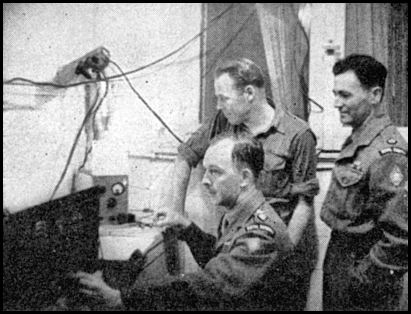 |
|
Briefly on the 'Amateur' air (me nearest) (Photo courtesy of US magazine QST) |
Three of us were licenced radio amateurs - our brilliant chief techy (Warrant Officer John - centre in photo) and the founder of our unit, Major Denis (on right, visiting us from his warship base) and me. John concocted a simple amateur station in my unluxurious bedroom and in odd leisure moments I pounded the morse key to give a few hundred fellow hams around the world a rare callsign (MD5DNQ) for their collection.
Shortly the spasmodic sniping paused - discouraged by enthusiastic responses from our infantry colleagues. (Courage returned, however, within days when we started withdrawing). During the lull I dared to explore a little of the city. I ventured inside a small temple which dominated the square behind our base on the beach-head, and was appalled by the luxurious interior. Every bit of intricate plasterwork seemed decorated with gold leaf. This, I confess, reinforced in me a lifelong cynicism - I find it very hard to accept that families who cannot afford to feed their children nevertheless fund the obscene extravagances of their religion. The antithesis of Quakerism.
Only days after that we were subjected to sniper fire which emanated from the roof of the temple. I requested advice from the infantry. Three stocky, very-Glaswegian, members of the venerable Scots regiment whose tartan I had worn every Thursday ('OTC day') at school, reported to Pete, cocked their Sten guns, and disappeared in the direction of the temple. Half an hour later they returned and said "Ye'll no be having ony mair trouble from that direction, sir". I thanked them, adding "I hope you didn't need to shoot anyone?" Their Corporal said "Och no, that wisnae necessary". As they departed I thought they were smiling. Moments later there was an almighty explosion and the whole temple crumbled into dust and rubble. When my time comes I hope that Saint Peter will know that that wasn't my idea.
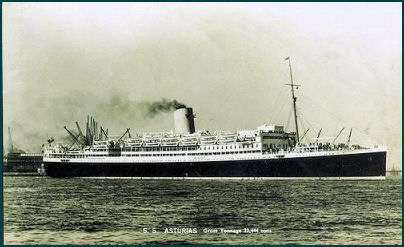 |
Came the inevitable withdrawal. I escaped the rubble and fleas of Port Said to be transported home in an almost empty luxury liner, SS Asturias. 1956’s final contrast. The premier stateroom was a suite of generous proportions and as I sat on its private terrace with a cold Daiquiri to hand and a lovely Swedish girl manicuring my broken finger-nails, the danger and discomfort of the previous weeks began to recede. Had I not wanted to be home for Christmas I might have wished for the snail's-pace of the outward journey!
Back at work at the BBC, I was riding the long escalator upwards at Oxford Circus when a familiar figure came sailing downward on the adjacent one. We greeted each other happily and he suggested I wait at the top and he would join me.
I wonder if you know that feeling ... meeting someone you know well but can recall neither a name nor any details because they are out of context? This was an older gentleman. Trim moustache - dark suit - bowler hat - rolled-brolly. After the enthusiastic greetings and handshakes we both confessed our puzzlement. He said "I've just come from Broadcasting House." I said I was going there. But I couldn't picture him in a studio or office - rather he'd been my guest at home - partial to single malt whisky.
Of course you will have guessed. This was one of the generals - in fact the CSO (Chief Signals Officer) - my boss in Port Said ... and the BBC's new Personnel Officer!
Postscript: 25 years later Margaret died and I was on my own for a year, then Ann and I married. It being midwinter we spent our honeymoon in Madeira at Reid's Hotel (in the suite in which Churchill had relaxed with his paintbox and easel). The impeccable Swiss manager invited the several other British guests to a welcome party for us. Two of the guests turned out to be colleagues (and, er, close friends - which we hadn't known!) - and another was General Sir John Hackett, the distinguished soldier/scholar. On several days when Ann was having a siesta Sir John and I sat in adjacent deck chairs and discussed (well, argued about) books and writing ... an enjoyable custom we had started in my hovel in Port Said.
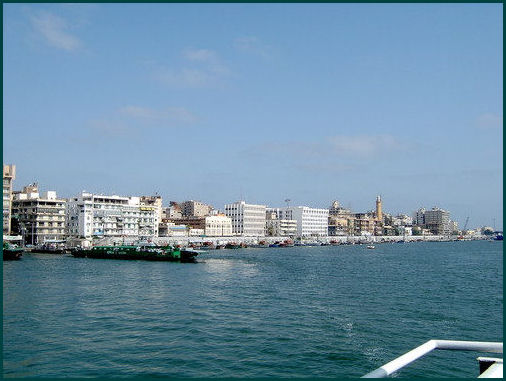 |
|
That waterfront now |
After 30 years with the BBC I left, went to management college, then spent 13 years creating new-media businesses worldwide. Being Chairman of an international group of companies and of the Cabinet Office "Information Industries" Council impressed no-one, but having known the Beatles gave me star status!
I can’t forget that at Christmas 1956 my small son took a long time to accept me again - daddies who disappear overnight are difficult to trust ... a sentiment the nation rightly applied to the politicians who had misheard the call to war.
D.H.M.
________________________________________________________
"Pick battles big enough to matter, small enough to win."
Jonathan
Kogol
_________________________________________________________
- - - - - -
Back to 'Contents' table
- - - - - -
| free web hit counter |
